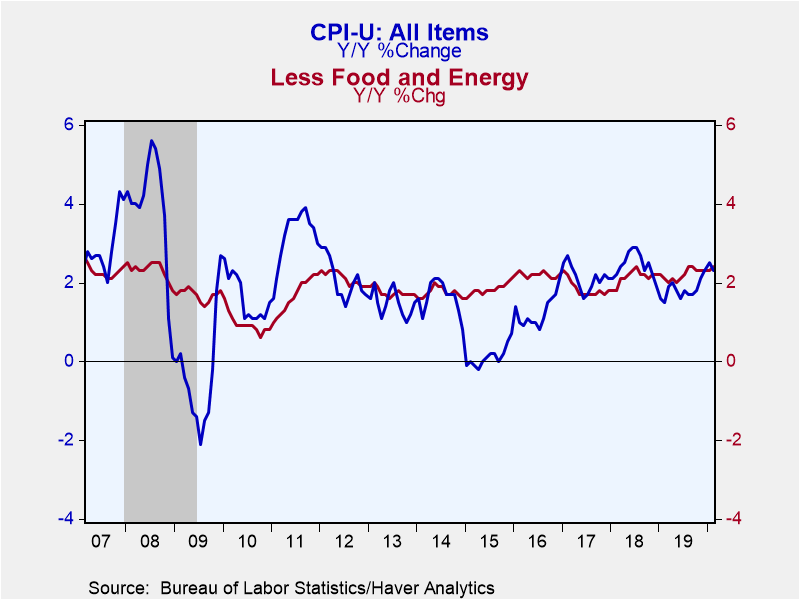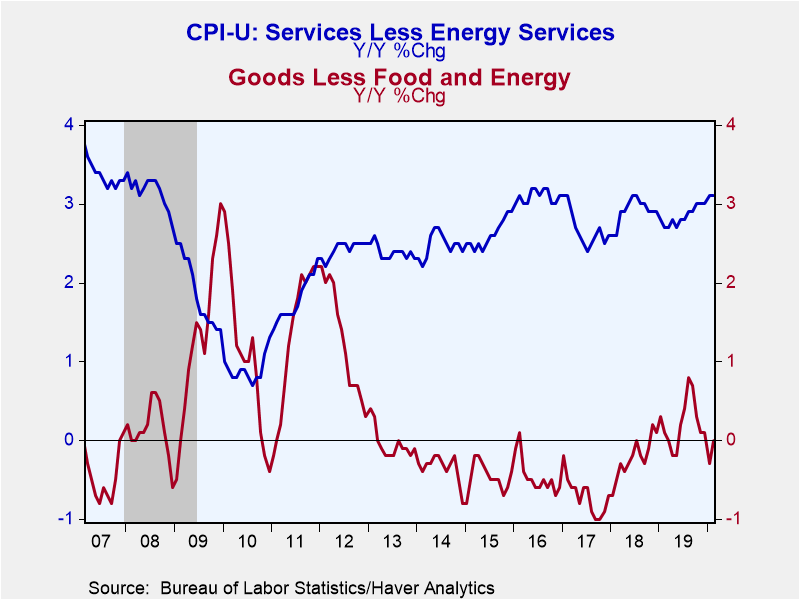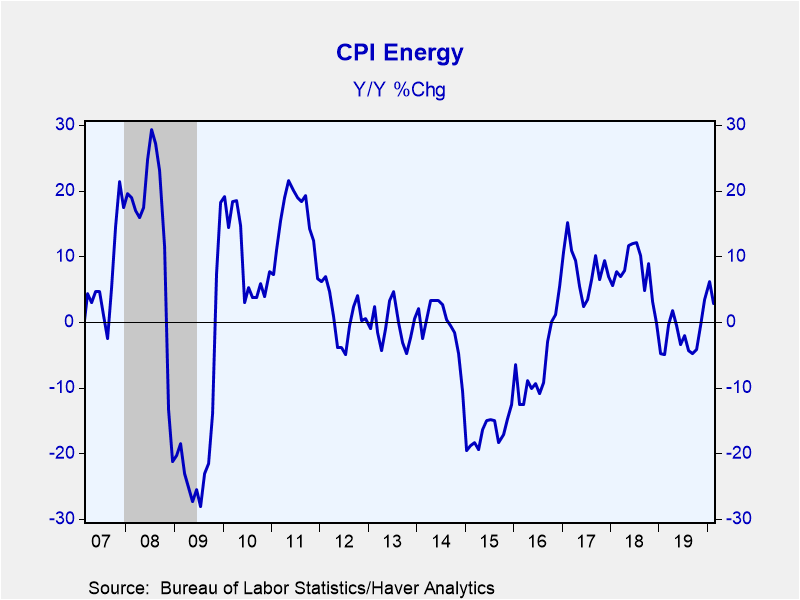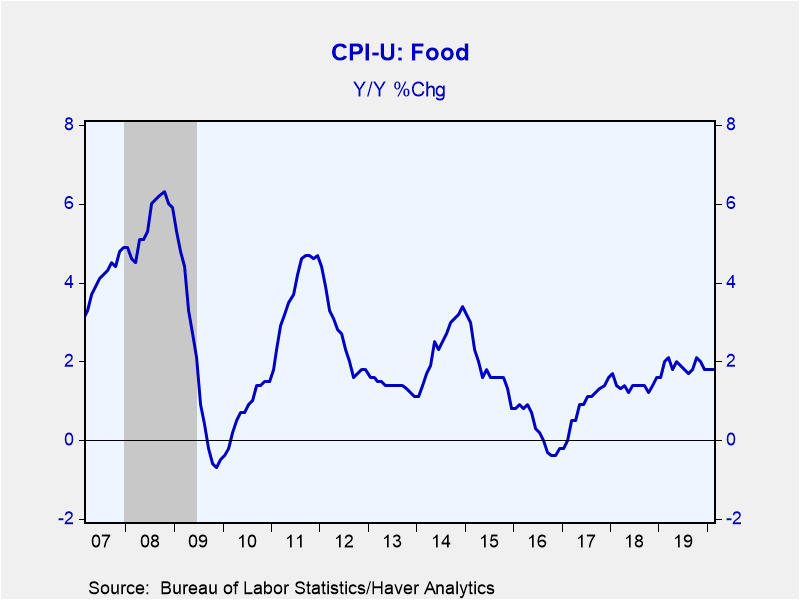 Global| Mar 11 2020
Global| Mar 11 2020U.S. Consumer Price Inflation Continues to Be Tame
by:Tom Moeller
|in:Economy in Brief
Summary
The Consumer Price Index edged 0.1% (2.3% y/y) higher during February for the second consecutive month. These gains followed two months of 0.2% increase. Expectations in the Action Economics Forecast Survey were for no change in the [...]
The Consumer Price Index edged 0.1% (2.3% y/y) higher during February for the second consecutive month. These gains followed two months of 0.2% increase. Expectations in the Action Economics Forecast Survey were for no change in the index level. The CPI excluding food & energy rose an expected 0.2% (2.4% y/y) last month, the same as in January.
A 2.0% decline (+2.8% y/y) in energy prices held back the rise in the CPI, following a 0.7% drop. Gasoline prices declined 3.4% (+5.6% y/y) and fuel oil prices fell 8.5% (-5.9% y/y). Natural gas prices eased 0.9% (-2.0% y/y) while the cost of electricity eased 0.1% (+0.6% y/y).
Goods prices excluding food & energy strengthened 0.2% (-0.0% y/y), the first increase in six months. The gain was led by a 0.6% rise in education & communications goods (-5.2% y/y) prices. Apparel prices rose 0.4% (-0.9% y/y) as did the cost of used vehicles (-1.3% y/y) . New vehicle prices edged 0.1% higher (0.4% y/y). Furniture costs rose 0.1% (-0.2% y/y) while appliance prices were unchanged (-1.2% y/y). Medical care goods prices eased 0.6% (+1.8% y/y) for a second straight month and recreation goods prices slipped 0.1% (-0.4% y/y).
Services prices rose 0.2% (3.1% y/y). Medical care service prices improved 0.3% (5.3% y/y) for the third straight month. Shelter costs rose 0.3% (3.3% y/y) as the owners equivalent rent of primary residences gained 0.2% (3.3% y/y). Education & communication prices improved 0.1% (2.1% y/y). Recreation services prices declined 0.5% (+2.3% y/y).
Food prices rose 0.4% (1.8% y/y). Meat prices increased 0.3% (3.7% y/y), while dairy product prices strengthened 1.2% (3.6% y/y). Cereal & bakery product prices increased 0.5% (0.2% y/y) while fruit & vegetable prices held steady (-1.6% y/y). Egg prices declined 0.8% (-4.0% y/y) while nonalcoholic beverage prices rose 0.5% (0.4% y/y).
The Consumer Price Index data can be found in Haver's USECON database with additional detail in CPIDATA. The Action Economics survey figure is in the AS1REPNA database.
| Consumer Price Index, All Urban Consumers (% chg) | Feb | Jan | Dec | Feb Y/Y | 2019 | 2018 | 2017 |
|---|---|---|---|---|---|---|---|
| Total | 0.1 | 0.1 | 0.2 | 2.3 | 1.8 | 2.4 | 2.1 |
| Total less Food & Energy | 0.2 | 0.2 | 0.1 | 2.4 | 2.2 | 2.1 | 1.8 |
| Goods less Food & Energy | 0.2 | -0.0 | -0.0 | -0.0 | 0.2 | -0.2 | -0.7 |
| Services less Energy | 0.2 | 0.3 | 0.2 | 3.1 | 2.8 | 2.9 | 2.7 |
| Food | 0.4 | 0.2 | 0.2 | 1.8 | 1.9 | 1.4 | 0.9 |
| Energy | -2.0 | -0.7 | 1.6 | 2.8 | -2.1 | 7.5 | 7.9 |
Tom Moeller
AuthorMore in Author Profile »Prior to joining Haver Analytics in 2000, Mr. Moeller worked as the Economist at Chancellor Capital Management from 1985 to 1999. There, he developed comprehensive economic forecasts and interpreted economic data for equity and fixed income portfolio managers. Also at Chancellor, Mr. Moeller worked as an equity analyst and was responsible for researching and rating companies in the economically sensitive automobile and housing industries for investment in Chancellor’s equity portfolio. Prior to joining Chancellor, Mr. Moeller was an Economist at Citibank from 1979 to 1984. He also analyzed pricing behavior in the metals industry for the Council on Wage and Price Stability in Washington, D.C. In 1999, Mr. Moeller received the award for most accurate forecast from the Forecasters' Club of New York. From 1990 to 1992 he was President of the New York Association for Business Economists. Mr. Moeller earned an M.B.A. in Finance from Fordham University, where he graduated in 1987. He holds a Bachelor of Arts in Economics from George Washington University.
More Economy in Brief
 Global| Feb 05 2026
Global| Feb 05 2026Charts of the Week: Balanced Policy, Resilient Data and AI Narratives
by:Andrew Cates










